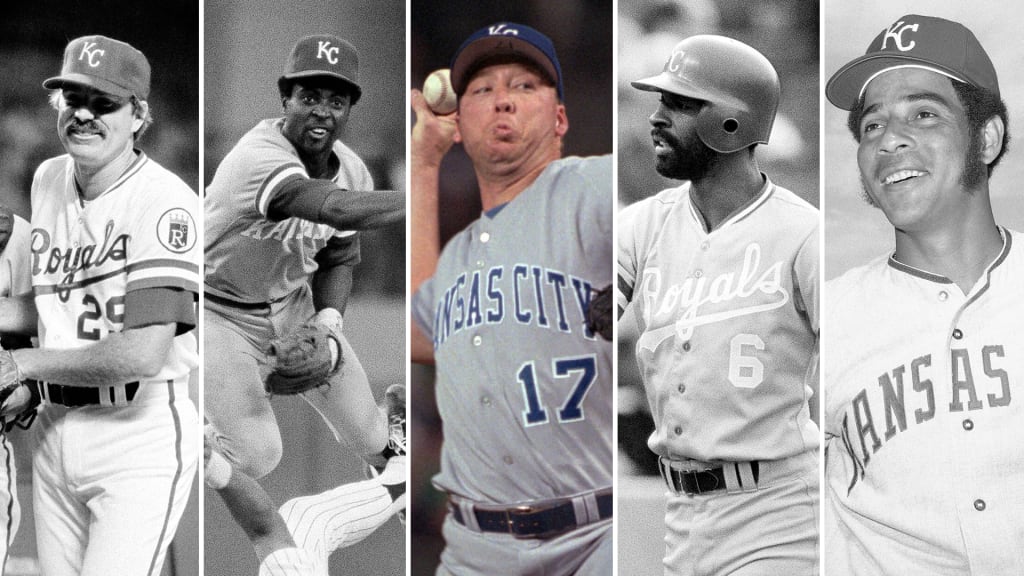
KANSAS CITY -- There’s only one Royal represented in the Baseball Hall of Fame: The best player in franchise history, George Brett.
That means there’s a lengthy list of players who could have been in consideration for Cooperstown. Here’s our take on the top five of those names.
1) Frank White, 1973-90
Key facts: Five All-Star Games, eight Gold Glove Awards
White’s legacy is that he is one of the greatest defensive second basemen in baseball history. He held the club record for Gold Glove Awards until recently, when Alex Gordon tied him with eight.
White, the best success story of the once-famed Royals Baseball Academy in the 1970s, had a storied career with Kansas City, earning a Most Valuable Player Award in the '80 American League Championship Series.
Of course, the debate has raged on for years in Kansas City as to why Bill Mazeroski, a Hall of Famer with statistics nearly identical to White's, is in the Hall of Fame and White is not. White’s last year on the ballot was in 1996, when he received 3.8 percent of the vote, just shy of the 5 percent minimum to stay on the ballot.
The great Cardinals shortstop Ozzie Smith once said of White, “I often wondered what it would be like to have Frank as my team’s second baseman. Frank was the best, and it’s a shame he’s not in the Hall of Fame.”
White, now the county executive for Jackson County, Mo., is in the Royals Hall of Fame. A bronze statue of White resides at Kauffman Stadium. His No. 20 is one of three retired numbers in Royals history.
2) Amos Otis, 1970-83
Key facts: Five-time All-Star, three-time Gold Glove Award winner
White, the Royals’ best second baseman of all time, said this of Otis a few years ago: "When people ask me about the guys I played with, they will say, ‘George Brett is the greatest hitter in Kansas City history.’ And I agree with that. But as far as a player, if you judge him in every facet of the game, this guy here [Amos Otis] is the best player who ever played for the Kansas City Royals.”
Otis finished his Royals career with 1,977 hits (2,020 overall).
“If I had played 21 years, I might have gotten to 3,000 hits,” Otis once said. “Plus, I was playing in a big ballpark in Kansas City, so that took away from hits and home run totals. In today’s ballparks, I might have hit 400 home runs and have had a shot at the Hall of Fame. Hey, I didn’t make the Hall of Fame, but I still think I had a decent career.”
3) Willie Wilson, 1976-90
Key facts: Two-time All-Star, one-time Gold Glove Award winner and AL batting title winner ('82)
Wilson was an electrifying player. He finished in the top 10 in stolen bases across MLB for six seasons, and his 83 swipes in 1979 topped the Majors.
And Wilson used that speed everywhere on the diamond. His 230 hits and 133 runs scored in 1980 led the Majors. He also led either the Majors or the AL in triples in five seasons during his career.
“It was just such a weapon to have him at the top of the lineup,” Brett once said. “It was always taking that extra base, always putting pressure on the defense. Teams were scared on how to defend our speed.”
Wilson finished his career with 2,207 hits and 668 stolen bases.
4) Kevin Appier, 1989-99, 2003-04
Key facts: One All-Star Game, led AL with 2.56 ERA in 1993
Appier was perhaps one of the more overlooked Royals in terms of accomplishments, mainly because he played in a very down time in Royals history as they transitioned following the death of longtime owner Ewing Kauffman.
But Appier was a dominant pitcher in the AL from 1990-93, posting ERAs of 2.76, 3.42, 2.46 and 2.56 in that span. He held his own over the next four seasons as well, even as offensive numbers rose across baseball.
Appier also was a workhorse, throwing 200 or more innings six times during his career with the Royals. His best season came in 1993, when he went 18-8 with a 2.56 ERA while tossing a career-high 238 2/3 innings.
5) Dan Quisenberry, 1979-88
Key facts: Three-time All-Star, led AL in saves five times
This may be a surprise choice over other notable Royals such as Bret Saberhagen, Mike Sweeney and David Cone.
But Quisenberry truly was an amazing closer in his time, during an era when relievers had to earn their saves. When Quiz pitched, closers routinely pitched multiple innings to get their save.
Quisenberry’s 238 career saves are second on the Royals’ all-time list to Jeff Montgomery’s club-record 304. Of Quisenberry’s 238 saves, more than half (120) required six outs or more. And for his career, Quisenberry averaged 1.73 innings per save, second only all-time to Hoyt Wilhelm’s 1.85.
Quisenberry also had remarkable accuracy. He issued only 92 unintentional walks and threw just four wild pitches over his career, which spanned 1,043 1/3 innings.
Quisenberry’s last year on the HOF ballot was in 1996, when he garnered 18 votes, six shy of the 5 percent total he needed to remain on the ballot.
